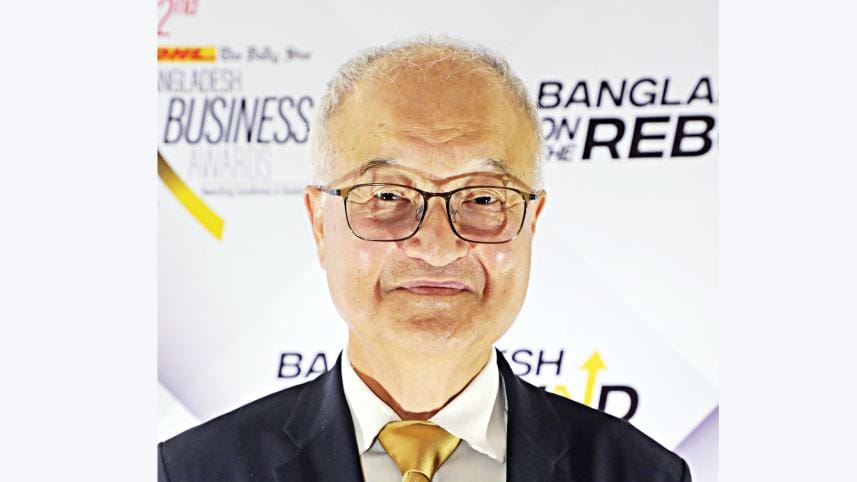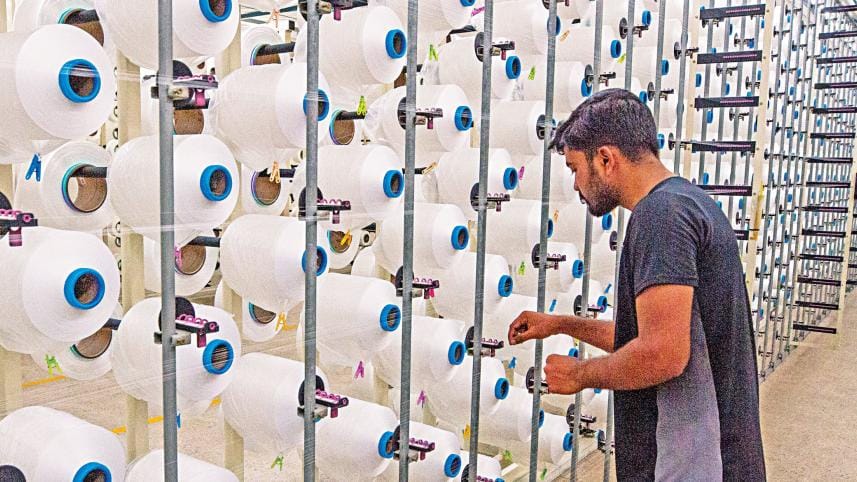I have learnt to respect workers: Kihak Sung

Kihak Sung, chairman of Youngone Corporation and a pioneer in Bangladesh's readymade garments (RMG) and textile sectors, has been instrumental in the country's rise as a major global exporter.
Sung, born in 1947 in Seoul, Korea, studied international economics at Seoul National University. After working at Seoul Trading, he founded Youngone Corporation in 1974, focusing on manufacturing outdoor apparel.
Since establishing its first plant in Seongnam, South Korea, it has now become the premier manufacturer of outdoor apparel -- sportswear, down jackets, footwear and other gear.
Sung's commitment to environmental issues and quality has shaped the long-term philosophy and vision of the company.
These principles, along with a relentless drive to improve people and products, helped Youngone become a pioneer in the industry.
In 1980, Sung made a groundbreaking move by setting up Bangladesh's first foreign-owned apparel manufacturing plant in Chattogram.
This was the beginning of Bangladesh's transformation into a hub for garment production.
Youngone Corporation now operates production facilities in Bangladesh, Vietnam, China, El Salvador, Ethiopia and Uzbekistan, and has offices in major cities around the globe, making it a truly global and multinational entity with over 100,000 employees.
"It was accidental that we came to Bangladesh. We were induced to invest in the country by a Korean resident who was involved with a construction project here,'' Sung said in an interview with The Daily Star recently.
In 1987, Youngone set up a factory in the Chittagong Export Processing Zone. The Dhaka EPZ, which began operations in 1993, also welcomed Youngone as its first investor.
Youngone's factories in the country produce high-quality jackets, trousers, sports shoes and leather goods for international markets.
The company currently employs approximately 70,000 people in Bangladesh, making it one of the nation's largest employers.

However, one of Sung's most significant contributions to Bangladesh was the development of the Korean Export Processing Zone (KEPZ) in Chattogram.
The KEPZ, which began its operations in 2011 under the Bangladesh private EPZ act, covers 2,492 acres of land, of which 52 percent is kept green by plantations, water bodies and open areas.
KEPZ especially focuses on renewable energy and thereby supports the development of rooftop solar power technology for renewable energy and to decrease reliance on fossil fuels.
Youngone has established a 40-MW solar rooftop power plant in the KEPZ, the biggest in Bangladesh.
This unique zone is the country's only private export processing area where humans, flora and fauna peacefully coexist with machines.
Within the industrial enclave, there are 33 lakes and waterbodies, which attract around 137 species of birds and more than 87 mammals.
A subsidiary of the South Korean Youngone Corporation, the KEPZ currently hosts 48 industrial units, largely under the ownership of Youngone.
Youngone is also recognised as a pioneer in establishing export-oriented garment factories in Bangladesh.
Its factories specialise in producing premium jackets, trousers made from synthetic fibre, sports shoes, leather handbags, backpacks, and travel bags for international retail markets.
Since the commencement of the project, the KEPZ has created direct job opportunities for 31,000 individuals, most of whom are female. It has also created over 25,000 indirect jobs outside the zone.
Presently, the KEPZ factories collectively export goods worth approximately $400 million each year.
In his illustrious career, Kihak Sung has held various prestigious roles, including as chairman of the Korea Federation of Textile Industries and president of the International Textile Manufacturers Federation.
He faced a major challenge after the devastating cyclone in 1991. The damage left the entrepreneur with a major decision regarding continuing investment in Bangladesh.
Sung said he got a report on the devastation of the cyclone two to three days after the disaster hit the region and the decision he took was the turning point for his business in Bangladesh.
"We lost 300,000-400,000 garments waiting for shipment. All the fabrics and accessories for the season's production were damaged. Luckily, we had no casualties. While recovering from the disaster, we learned how desperate our employees were to keep their jobs," Sung said.
"I decided to make a substantial investment in building a new multi-story factory to protect against similar disasters in the future. We also decided to double our workforce to reproduce the garments we lost in time to support our clients' upcoming business needs," he added.
"The approach worked as all our employees showed remarkable resilience and unselfish dedication to work. Next season, our clients doubled their orders," he recalled.
Under his leadership, Youngone Corporation has kept its proud legacy while navigating several challenges.
In 1987, Youngone Corporation established a legal entity with an investment of $200,000 in Kingston, Jamaica but had to close it down.
However, Sung dealt with the setback effectively and established a new legal entity in El Salvador in 2001 and has been managing the operations from there since then.
According to him, since the inception of Youngone, the majority of production was ski wear of nylon fabric with down filling or polyester insulation.
"We replicated it in Bangladesh. However, we are now using newly developed polyester fabrics of high quality," he added.
Reflecting on his long business career, Sung said he experienced both sides of the coin—good times and hardships.
He said the vision and human-centric philosophy helped him overcome the hardships.
"I have enjoyed making products for my favourite sports. I have saved many brands from failure. I have successfully created and kept nearly 100,000 jobs," he said on his successes during the journey.
"I have learned how to respect workers and try to provide a good working environment as much as possible. With patience and integrity, I survived through many difficulties and disasters. I am happy that I could keep working in the same industry for 52 years," he said.
"I am grateful for that."




 For all latest news, follow The Daily Star's Google News channel.
For all latest news, follow The Daily Star's Google News channel.
Comments